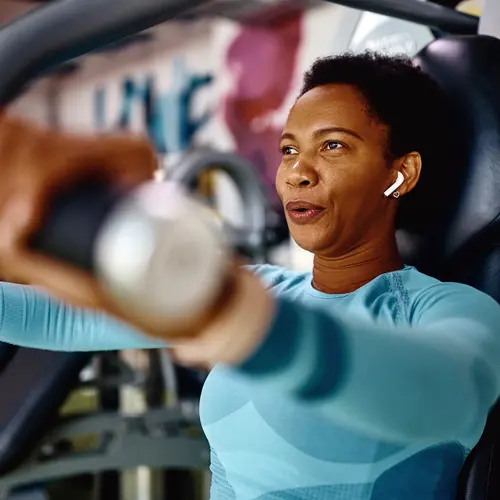Sept. 13, 2001 -- Eric Snider, a music critic for The Weekly Planet in Tampa, Fla., says people often joke when they see him wearing foam earplugs at rock concerts. How good can the concert be if the critic is muffling the sounds?
But Snider, 45, is simply taking precautions against the often relentless noise level.
"Someday,'' he says, ''I hope to be able to hear what my grandchildren are saying." Snider has worn earplugs for a long time, but lately he has noticed more people, especially his colleagues, doing the same.
When Hearing Goes
Many others exposed to high-decibel surroundings, however, are not as cautious as Snider -- and may regret it.
Years of exposure to loud concerts, cranked-up stereos, personal CD players, leaf blowers, and other environmental noises are a big part of the reason doctors are now seeing more middle-aged people with hearing loss. It used to be that people aged 65 and older were the most likely to need hearing aids, but now hearing loss is a boomer phenomenon -- as demonstrated by one of the more famous boomers, former President Bill Clinton, who was fitted with hearing aids while in office.
Statistics support doctors' observations that people are suffering from hearing loss at younger ages. Between 1971 and 1990, the number of people between the ages of 46 and 64 with hearing loss increased 26%, and the number between the ages of 18 and 44 increased 17%, according to the National Health Interview Survey.
The Root of the Loss
Exposure to loud noises can damage hearing by harming sensitive hair cells in the ear, says James F. Battey Jr., MD, PhD, director of the National Institute on Deafness and Other Communication Disorders. These hair cells move as sound waves travel through the ear structures, and the movement is converted to nerve impulses that are interpreted by the brain as sound.
A single loud noise, such as a gunshot blast, can do permanent damage to these structures. But Battey says years of high-decibel exposure are more often to blame for hearing loss in middle age.
A Rocker's Story
That was true for Kathy Peck. As guitarist for a punk band in the 1970s and 1980s, she regularly spent time on stage close to loudspeakers. By the mid-1980s, "I realized I couldn't hear clearly what people were saying," Peck says.
Her hearing loss prompted Peck and a friend, Flash Gordon, MD (a physician, not the comic strip character), to establish HEAR (Hearing Education and Awareness for Rockers). The organization seeks to inform musicians and fans about the dangers of loud music and promotes the use of earplugs at shows.
At the organization's clinic in San Francisco, Peck notices more and more middle-aged adults with hearing problems coming in for help. And she is reaching out to educate the boomers' children about the dangers of loud recorded music at dance events, which are often more popular with today's youth than live concerts.
What Can Be Done?
Even if there is already hearing loss, protecting the ears can minimize further injury. Earplugs, sold in most drugstores, should be worn when people are around loud power tools or attending loud concerts. Larger earphone-like devices can help for especially loud tools, like leaf blowers, Battey says.
When hearing loss is already severe, a hearing aid may be required.
One option is the new disposable hearing aid marketed by Songbird Medical. The device lasts about 40 days, says company President and CEO Frederick Fritz. And because the battery is built-in and discarded with the device, the hearing aid doesn't have a battery door, standard on other hearing aids. That allows room for a bigger microphone, which improves sound quality, according to Fritz.
Like the disposable model, many other hearing aids now fit completely in the ear canal, and are nearly invisible to other people. And that, designers and ear specialists hope, may convince hard-of-hearing boomers to do something about their problem -- without broadcasting their accumulation of birthdays.

